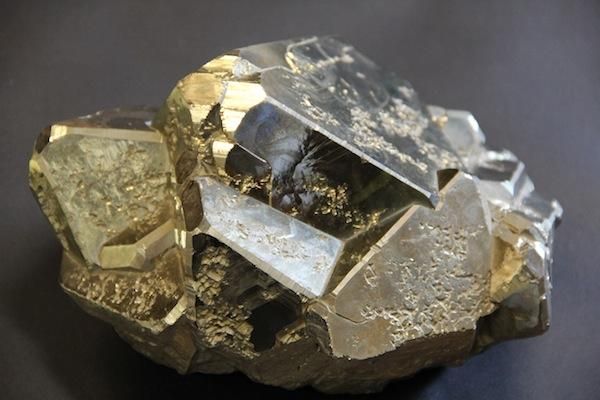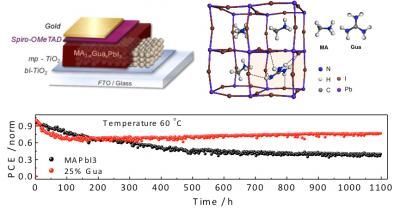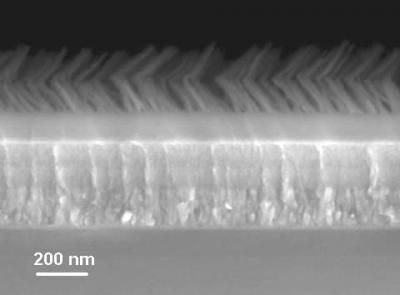Scientists get to the heart of fool's gold as a solar material
As the installation of photovoltaic solar cells continues to accelerate, scientists are looking for inexpensive materials beyond the traditional silicon that can efficiently convert sunlight into electricity.

University of Wisconsin-Madison Geology Museum
Theoretically, iron pyrite - a cheap compound that makes a common mineral known as fool's gold - could do the job, but when it works at all, the conversion efficiency remains frustratingly low. Now, a University of Wisconsin-Madison research team explains why that is, in a discovery that suggests how improvements in this promising material could lead to inexpensive yet efficient solar cells.
"We think we now understand why pyrite hasn't worked," says chemistry Professor Song Jin, "and that provides the hope, based on our understanding, for figuring out how to make it work. This could be even more difficult, but exciting and rewarding."
Although most commercial photovoltaic cells nowadays are based on silicon, the light-collecting film must be relatively thick and pure, which makes the production process costly and energy-intensive, says Jin.
A film of iron pyrite - a compound built of iron and sulfur atoms - could be 1,000 times thinner than silicon and still efficiently absorb sunlight.
Like silicon, iron and sulfur are common elements in the Earth's crust, so solar cells made of iron pyrite could have a significant material cost advantage in large scale deployment. In fact, previous research that balanced factors like theoretical efficiency, materials availability, and extraction cost put iron pyrite at the top of the list of candidates for low-cost and large-scale photovoltaic materials.
In the current online edition of the Journal of the American Chemical Society, Jin and first author Miguel Cabán-Acevedo, a chemistry Ph.D. student, together with other scientists at UW-Madison, explain how they identified defects in the body of the iron pyrite material as the source of inefficiency. The research was supported by the U.S. Department of Energy.
In a photovoltaic material, absorption of sunlight creates oppositely charged carriers, called electrons and holes, that must be separated in order for sunlight to be converted to electricity. The efficiency of a photovoltaic solar cell can be judged by three parameters, Jin says, and the solar cells made of pyrite were almost totally deficient in one: voltage. Without a voltage, a cell cannot produce any power, he points out. Yet based on its essential parameters, iron pyrite should be a reasonably good solar material. "We wanted to know, why is the photovoltage so low," Jin says.
"We did a lot of different measurements and studies to look comprehensively at the problem," says Cabán-Acevedo, "and we think we have fully and definitively shown why pyrite, as a solar material, has not been efficient."
In exploring why pyrite was practically unable to make photovoltaic electricity, many researchers have looked at the surface of the crystals, but Cabán-Acevedo and Jin also looked inside. "If you think of this as a body, many have focused on the skin, but we also looked at the heart," says Cabán-Acevedo, "and we think the major problems lie inside, although there are also problems on the skin."
The internal problems, called "bulk defects," occur when a sulfur atom is missing from its expected place in the crystal structure. These defects are intrinsic to the material properties of iron pyrite and are present even in ultra-pure crystals. Their presence in large numbers eventually leads to the lack of photovoltage for solar cells based on iron pyrite crystals.
Science advances by comprehending causes, Jin says. "Our message is that now we understand why pyrite does not work. If you don't understand something, you must try to solve it by trial and error. Once you understand it, you can use rational design to overcome the obstacle. You don't have to stumble around in the dark."
Organizations
Other news from the department science

Get the chemical industry in your inbox
By submitting this form you agree that LUMITOS AG will send you the newsletter(s) selected above by email. Your data will not be passed on to third parties. Your data will be stored and processed in accordance with our data protection regulations. LUMITOS may contact you by email for the purpose of advertising or market and opinion surveys. You can revoke your consent at any time without giving reasons to LUMITOS AG, Ernst-Augustin-Str. 2, 12489 Berlin, Germany or by e-mail at revoke@lumitos.com with effect for the future. In addition, each email contains a link to unsubscribe from the corresponding newsletter.



























































